Gather round, friends, and tarry with me but a short while. The tale I spin has oft been told'tis true'and the stuff of legend, some might say. Others, not so kind, have dismissed my recitation as a fool's dream, nothing more than wishful fancy. Dream or legend? I must leave such judgment up to you, for I am a simple storyteller.
Picture a bodybuilding world quite different from our own, a kind of muscular Brigadoon, born in the hazy 1950s and destined to wither with Arnold Schwarzenegger's momentous ascent. This golden landscape was ruled by Larry Scott, a most benevolent king, indeed. King Larry's court included many shining princes: Freddy Ortiz, Chuck Sipes, Dave Draper, Bill McArdle, Reg Lewis and young Frank Zane among them. All were strong men who were noble and good and utterly without stain.
Yet, all was not well in Brigadoon. One magnificent prince, Don Howorth, possessed the gift of second sight, drawing him to look beyond Brigadoon's lush borders. There, in the indeterminate future, different rewards and greater satisfactions awaited. Enticements, for certain, because Sir Don had also foreseen Brigadoon's eventual demise. Dare he step over the border?
The decision weighed heavily upon him. He sought counsel. Sage upon sage offered guidance, but Sir Don's adventurer's soul desired freedom. Nothing could quell its need to fly.
So the fateful day came when Sir Don departed Brigadoon. It was 1968, the dawning of another age. An exodus soon began, and Brigadoon, too fine to last, drifted into time, never to be seen again.
Many years have since passed. Brigadoon's king, its princes and admirers, were forced by change to begin again, their hopes bruised. They, like Sir Don, would survive and even prosper'for each knew the meaning of honor, wisdom and courage.
In the new millennium bodybuilding fame lasts a breath; fortunes and health vanish like frost on a warm windowpane. Brigadoon's elder statesmen watch and shake their heads; they can remember a finer existence, where camaraderie and joy, good health and well-being meant life itself.
And what of Sir Don? Did he ever find his destiny beyond Brigadoon? Different rewards and greater satisfactions? Yes and, alas, no. It has oftentimes been a perilous journey. For many decades we heard nothing from him, and his absence made our collective heart ache.
Time isn't always an enemy; it can heal old wounds, bring reflection, realign perspectives and bestow a special peace. Don Howorth has come full circle, joined the chosen few and become an IRONMAN legend.
It's fitting, somehow, that he should choose us for his re-emergence, because we, too, believe in the magic that was once Brigadoon.
IM: Well, Don, 35 years after you took home the Mr. America trophy, IRONMAN has made it official: you are a legend!
DH: You're kidding. Me, a legend? How'd you ever find me?
IM: You can thank Larry Scott for that.
DH: Larry's a great guy and a great friend. You wanna know something? For the longest time I was a forgotten name. Lately, though, folks have been walking up to me and saying, 'Aren't you the Don Howorth?' Now, IRONMAN is giving me a legends spin. That's mind-boggling!
IM: Here's how I see it: You're a classic bodybuilder from an era too long ignored. The public might think bodybuilding began with Arnold, but there were many who came before, genuine movers and shakers. And they did it for love of the sport. Nothing else.
DH: You put it very poetically. None of us ever thought we'd be held up as a higher standard. [Laughs] Trailblazing was the last thing on our minds! We were just guys with a mission: to be bigger, better, healthier.
IM: With every legends interview we travel back to the early days, before Dame Fortune played her trump. Was Donny Howorth a typical kid?
DH: Childhood. What a wonderful part of life. I was pretty active, always falling out of trees, always getting into mischief. We lived in Garvey, California, which has since gone through several name changes'it's in the San Gabriel Valley. My parents moved to Garvey in 1941. Dad bought a lot and built a house for the amazing sum of $3,000. Yeah, I was your typical little boy, with all the bumps and bruises to prove it.
IM: Like Larry Scott, you were into gymnastics, an excellent way to launch the Howorth superbuild!
DH: That began in high school. I was on the gymnastics team and took it very, very seriously. To be a good gymnast, you must be strong. Lifting helped supplement my gymnastics, even though it was a no-no. Athletes in those days didn't use weights. They thought you'd get muscle-bound. I noticed changes in my physique right from the get-go. Everything was filling out, from my shoulders to my biceps and beyond. A solid physique can do wonders for your self-esteem.
IM: And bodybuilding eventually eclipsed gymnastics.
DH: Yes, it did. I joined Vic Tanny's Gym sometime around '53 or '54 because it was the only place close enough to me. In '56 I bought a membership at American Health Studios, where I met Steve Reeves. He looked so unreal'black hair, blue eyes, tanned and put together unlike anyone I'd ever seen, before or since. Steve Reeves epitomized bodybuilding. He was the greatest and still is, in my mind.
IM: Sounds like you experienced an epiphany of sorts.
DH: Oh, like you wouldn't believe! When I realized that weight training was the key to a perfect body, I wanted to find out what it could do for me. The gym became my second home. Bodybuilding was all we talked about'reps and methods and training secrets. There were no shortcuts. We worked our asses off, day in and day out. Only death and illness kept us from lifting'and sometimes not even those!
IM: After American folded, where'd you go?
DH: Back to Vic's, where I stayed, on and off, for another year and a half. Then in '58 I herniated two disks and had to be put in traction. As soon as I was able to get on my feet again, I hit the gym. My mom would threaten me almost every day: 'Don't you dare let me catch you lifting those weights!' she'd say. The doctor had given explicit orders about exercising, so that called for a little ingenuity. I'd work out, wash my back brace and go home. Mom never suspected a thing, but I finally told her. Took me five years to bring my strength up to where it had been before the accident.
IM: Your Pasadena Gym period came next. That's when you began competing, right?
DH: You've done research on me. I'm flattered. The Pasadena Gym, owned by my buddy Gene Moz'e. What memories! I stayed there for four years and gained 60 pounds of bodyweight. Everybody wanted to know what I'd been doing because my shoulders were so wide. On the street it was even more insane. Folks would stop, stare and whisper to one another. I've never truly felt comfortable with how people respond to my look. I don't wear tight T-shirts or walk around shirtless. And being in competition, almost nude, was very, very trying and a little embarrassing. I think part of being a Scorpio is keeping a secret part to yourself. Even today I prefer a loose shirt and a pair of jeans. Nothing conspicuous.
IM: What was the atmosphere like at the Pasadena Gym, friendly to bodybuilders or did powerlifters rule the roost?
DH: Well, it was a little on the cliquey side. Pat Casey, a famous powerlifter, trained at Pasadena, and he had his own following. Those were the days when powerlifting was considered a real man's sport. To the hardcore guys bodybuilding was just a male beauty contest in disguise. We bodybuilders managed to carve out our own little niche. I represented Pasadena at the '63 Mr. L.A. and Mr. California contests, which I won. I also entered the Mr. Southern California, Mr. Western America and Mr. Fiesta. I took third in the '61 Fiesta and won it the following year.
IM: You were one of the guys who trained with the late'and greatly missed'Vince Gironda. I heard he could be a terror.
DH: Vince was the Iron Guru, a real character. And, yeah, he could be a terror too. Very blunt, very to the point'that was Vince. Gene and I signed on at his gym because Vince's Gym was where all the bodybuilders of the day hung out. It was a great place. At Vince's we concentrated on the matter at hand: building muscle. Nobody in the real world could figure out what the hell we were doing to ourselves. Everyone immediately assumed because you had brawn, you lacked brains. They'd look at us like we were freaks. For me it was a personal thing. I wanted to have a life outside of bodybuilding. People would ask me, 'Are you a football player?' One girlfriend remarked that it looked like I was going to break in half because my shoulders were so big and I had a small waist. That's when I was carrying 20-inch arms. Hell, I took it as a compliment.
IM: And those were the days before steroids!
DH: Hold on. We tried steroids. I had a nutritionist, Rheo H. Blair, who helped out all the bodybuilders. He put me on a diet on which I was eating an enormous amount of dairy and meat products, and I also did a minimal amount of Dianabol.
IM: That's nothing compared to what's going down today.
DH: It's crazy how things have deteriorated. Some champs work their arms or chest or whatever only once a week. We worked them as often as humanly possible. And we wanted balanced physiques. There were none of those distended bellies and other side effects from being on the juice.
IM: Plus, each star had his own identity. You wouldn't confuse Larry Scott with Harold Poole. Their physiques were totally unique.
DH: Because we had unique training methods, and, of course, our bodies reacted differently to weights. It wasn't just about getting big or putting on fat and bulk. We were after quality muscle. Our physiques were planned, like building a house. The foundation had to be rock-solid, and all of it was physically very hard work.
IM: Remember this [holds up a vintage copy of Strength & Health]?
DH: Oh, yeah! My first cover. In 1964 and '65 I made quite a few covers, and here's the strange thing: I never considered any one shot to be my best. I didn't like being in front of a camera. My arms were 18 inches, and I thought they looked like sticks. Only after the '67 America did I feel I looked good enough, and by then I'd already decided to leave bodybuilding. Photo sessions were a trial. I hated every picture, though they look fine to me now. Gene Moz'e took the most, and Artie Zeller and Rheo Blair snapped several more. Unfortunately for me, I never posed for Russ Warner, and that's something I regret.
IM: I can't stress this enough, and I speak for so many others: You're a part of us. When I was a kid, I'd paste your pics in my scrapbook and feel such wistful envy. I wanted to be just like you.
DH: Comments like that really knock the wind out of me. The early '60s was a good time, but I was just one of the muscle crowd. Scott and Pearl and Sergio were the superstars. It touches my heart to find out I inspired and affected people in a positive way.
IM: Competitionwise, your first major event was the '63 AAU Mr. America, wasn't it?
DH: Well, the America wasn't my first major contest. I'd already won the Mr. California in '63, the '63 Western America and the '63 L.A. and Junior L.A. before entering the America. John Grimek himself invited me to compete, and who could resist such an invitation?
IM: Didn't the AAU shows have strength requirements?
DH: All AAU-sponsored bodybuilding contests had strength requirements. Bob Hoffman, who backed the AAU, was very big on Olympic lifting. Competitors did a clean and jerk, a standing military press and a snatch. I was qualified by Bob Hise from the YMCA. We were always so afraid of being compared to a beauty contest; that's why there had to be feats of strength involved'to give us legitimacy as athletes.
IM: Vern Weaver copped the title, but I thought you looked just as sharp.
DH: I can't complain. It wasn't my time, and Vern made an excellent champion.
IM: At the '66 competition you came in a close second to Chester Yorton. Then'poof!'no one saw Don Howorth. He disappeared.
DH: Heck, I didn't disappear. There was just nothing else left to enter in '66! Besides, I'd over-trained and needed to take three months off to recover. My workouts didn't begin again until January of '67, when I won the Junior Mr. America. Directly following, I went to Portland, Oregon, and gave a posing exhibition. I weighed 215, the best I'd ever looked up to that point.
IM: What was your mind-set, serious and focused?
DH: Very serious. I went to the gym to work. People would say, 'Don't talk to Donny,' because I was so into my training. Gym time isn't social time, and Vince would never put up with it. If you tried chatting people up at his gym, you'd quickly find yourself out the door.
IM: One of the memorable credits on your r'sum' is a 'Wild, Wild West' episode. You played a blacksmith, if I remember correctly.
DH: Good memory! I did an episode called 'Night of the Amnesiac' right after I won the Junior Mr. America. My scene was with Ross Martin, and I did play a blacksmith. The costume department couldn't find clothes big enough to fit me. The boots had to be slit up the backs to accommodate my calves.
Nineteen sixty-seven was a year of ups and down though. I'd trained specifically for the IFBB Mr. America and won against the favorite, Frank Zane. But none of it meant much to me. My victory rang hollow. I'd burned out on bodybuilding. I was 32 years old'at the height of my physical development'and I felt so tired. That's when I decided to walk away from the whole thing.
IM: You actually turned your back on bodybuilding?
DH: Yes, I did. The muscle scene was changing dramatically. Even if I'd stayed and won the Mr. Olympia, my career would've been history. And I'm not the only guy who felt that way. Bodybuilding was a dead end. No monetary rewards, viewed as a freak by the public, labeled morons and brain-dead by the media. I wanted to try other things, more interesting things, like silversmithing. I wanted to be creative.
My decision to leave bodybuilding was more a personal thing. The sport was consuming me, and I didn't want to be consumed. Always having to be in good shape, living your days and sometimes your nights at the gym. It's monotonous; it's boring. I'm one of those people who conquer something and then move on to the next challenge.
IM: But bodybuilding was all you knew.
DH: Yeah, and I wanted to see what else I could do. It was the '60s, and people were into spirituality, not being a Cro-Magnon. Bodybuilding just didn't fit in with the times. There was only a handful of stars, with Larry leading the way. No one even noticed my absence.
IM: And training? Don't tell me you gave that up too!
DH: Yep, the whole deal. The day I walked out of the gym, I felt released from bondage. That was in 1968. I lived in Studio City, worked for the film industry, had a nice car, great girlfriends, a good social life, and never went to the gym. Bodybuilding was part of my past, a closed chapter.
IM: Not for long though.
DH: No, not for long. Bodybuilding's a funny thing. It's like eating too much of your favorite food. You don't want any more. Then time passes, and you start craving the taste. In 1979, after almost a decade of inactivity, I went back to Vince's. I put on a posing routine at L.A.'s Embassy Auditorium, and it didn't go over well. I weighed about 183, down from 215, and looked good, but things had changed too much.
IM: The bodybuilding world was suddenly different.
DH: True. And I'd never taken that amount of 'roids; they spun me out of control. I lost a lot of weight, and with my type of body, if I lose weight, I lose muscle. It took me forever to gain back the pounds. I was in my early 40s, and for a year and a half I stayed at 160. Steroids made me very, very ill.
IM: What were your bodybuilding goals in the beginning? To be strong? For self-assurance?
DH: I just wanted to win the Mr. America, and I got out of the sport just in time. Who wanted to compete against Sergio? My goals in bodybuilding were simply to feel better about myself, to build myself up. Money was never a motivation. Shit, man, what money? Some of the guys sold their photos and training courses, like How I Built My Mr. America Shoulders, which I considered mostly bullshit. I couldn't take all the misrepresentations and distortions. It was doing a major number on me. I had to get out.
IM: You and fellow Mr. America Bill McArdle went into business together'at a gallery, right?
DH: That's right. Bill and I restored paintings. Our shop was at the far end of Studio City. We also did framing and matting. Very tedious. I'd work for an hour on one piece, matting, positioning and framing, only to flip it over and find that some dust had been caught inside the glass. Bill liked doing that stuff, but I didn't. Bored me to tears!
IM: We haven't heard much about Bill in recent years. A real shame. He's one of those golden names from the mid-'60s.
DH: Bill was a super guy, a kind of philosophical individual. He and Larry Scott used to live together near Vince's Gym. It's sad about Bill. His mother and father passed on, and then his apartment burned. All Bill's personal paintings were lost. He died in February 1995 of cardiac arrest. He was only 53.
IM: Bill was an artist? I didn't know that.
DH: I'd nicknamed Bill 'the Dabber' because of his painting style. He'd do anything for you, but life just overwhelmed him. We shared a lot of the same feelings about bodybuilding. It became kind of a joke for us. He was my good friend, and I'll never forget him.
IM: What did you do after leaving the gallery?
DH: I worked for a buddy who owned a clothing-manufacturing place. My days were long, seven to three or four, loading UPS freight. That's the only lifting I did. But bodybuilding pulls at you; it stays in the back of your mind. After a four-year break I started at Vince's again because I thought my health was going. As I'd gotten older, I developed weird food allergies'hives, stuff like that. My father became allergic to certain foods in middle age too, and I inherited it. The doctor said my job was too stressful, so I quit and began banging away in the gym. It took my mind off my physical problems.
IM: You injured yourself a second time. Your shoulder, right?
DH: Yes, I pulled my shoulder and hurt my rotator cuff. Woke up one morning and couldn't raise my left arm. Robert Bitonti, a sports physician, fixed me up in six months. I was able to get into really good shape during '85 and '86, perhaps the best shape of my life. Ever since I haven't strayed far from the weights. I still work out at North Hollywood Gym, owned by Mike Hockett, a former Mr. Oregon, four to five days a week. It's not that I'm a glutton for punishment, you understand. Lifting gives me purpose. It does me good.
IM: Mind if I ask a personal question?
DH: No, go ahead. I'm enjoying this talk.
IM: Are you happy? Wait, let me rephrase that: Have you found a measure of happiness in your life?
DH: Happiness is an instantaneous kind of thing. Hard to define. In the '50s and '60s life went slower. Nowadays nobody's calm. There's craziness everywhere. When I hear someone say, 'I'm doing great,' I gotta laugh. If that were the case, they wouldn't be digging themselves an early grave by working so hard. When I was younger, I found happiness in a nice sunset or the wind blowing through my hair. Watching the ocean always gave me a feeling of serenity'and it still does.
IM: If one lives long enough, an understanding of how things are usually occurs. The trick is living long enough, I guess.
DH: I just had a funny thought. What would it be like to go back in time and walk into Vince's Gym again'to see everyone who used to work out there? Nostalgia is a powerful force. Maybe it's just a longing for what I perceive as a simpler time. Everybody at Vince's put in a lot of years to get where they were, but once you were on top of that mountain, there was nowhere else to go.
The movies didn't hold anything for us. All we had left was dealing with Weider, which wasn't very pleasant. When I tell you how completely different today's era is from yesterday's, I mean it. The AAU wouldn't even allow contestants to wear oil, and there was no such thing as fake tanning products. I remember going to one contest, and there was this guy who'd actually used shoe polish to tan himself.
IM: In retrospect, are you glad you got out of competitive bodybuilding?
DH: Very glad because I escaped with my life. I've had my share of health problems, but none of them have been related to lifting weights. If anything, my gym time has helped me, physically and emotionally. When you're involved in a serious workout, something weird happens. Your mind soars. There's a healthy high from a good session with the iron. I look at bodybuilding now'and this has been going on since the mid '70s, at least'and what I see is a sport that has mutated into monstrosity. They want to get it into the Olympics. What a joke. If it ever does become a legit Olympic sport, the competitors will look much smaller than the ones in the Olympia. They'll have to be natural, 100 percent.
IM: Earlier we talked about obscurity. Does being forgotten have its rewards?
DH: Obscurity can have a good side. You're allowed privacy and the freedom to move around. You don't have to kiss ass. When you're on top, there are a lot of hangers-on around, and that doesn't happen when you've been forgotten. Gee, forgotten sounds so negative. I'd like to find another term.
IM: How about waiting to be rediscovered?
DH: Much, much better! Waiting to be rediscovered. Sums up my existence, at present. My life has been an interesting experience, with more peaks than valleys. I've learned not to sweat the small stuff. Just take it easy and keep an eye on tomorrow, that's my motto.
Editor's note: You can contact Don Howorth in care of Rod Labbe at 9 Belmont Ave., Waterville, ME 04901. IM












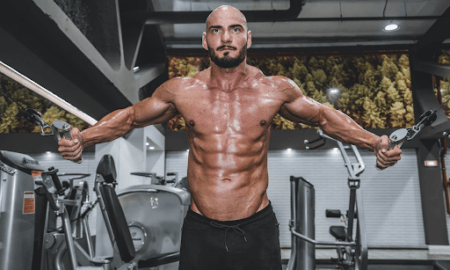
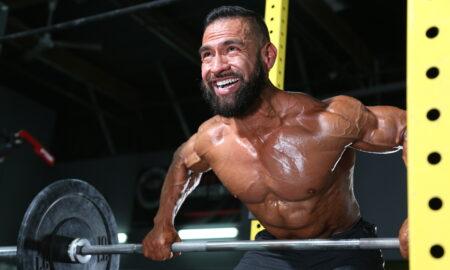
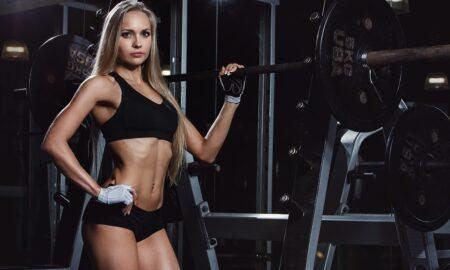
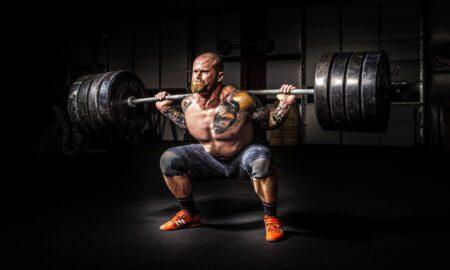
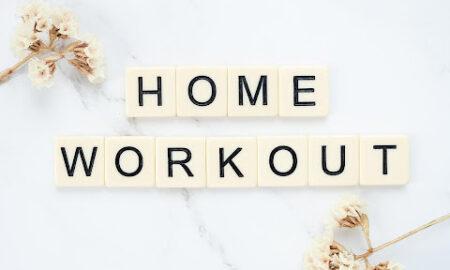

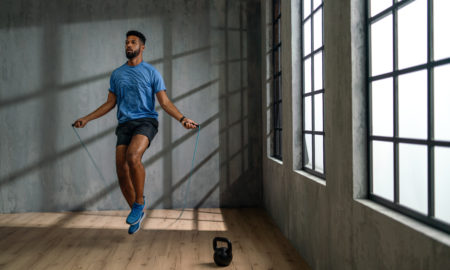
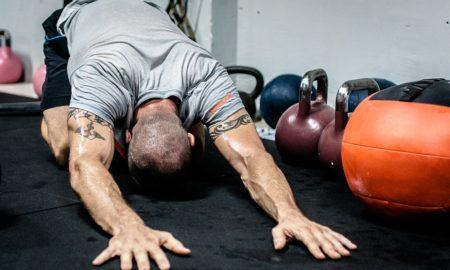
You must be logged in to post a comment Login